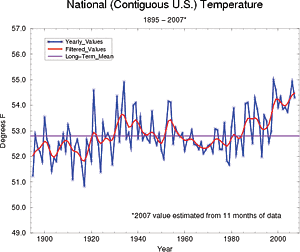Hot enough for you?
Once again, the year now ending is projected to be one of the 10 warmest on record, according to preliminary data from the Asheville-based National Climatic Data Center. The 10 warmest years globally have all occurred within the last decade, the report notes (the full 2007 climate report is due Jan. 10). The federal agency, a division of the National Oceanic and Atmospheric Administration, has been recording weather data since 1895.

For the planet as a whole, 2007 is expected to rank as the fifth-warmest year on record, following 2005, 1998, 2002 and 2003. For the U.S., this year will probably rank eighth, according to the report, with 1998 topping the list. But the differences between these years are slight, notes Climate Monitoring Branch staffer Richard Heim. “The actual numbers are so close that all you really have to do is sneeze at them and it will change.”
Western North Carolina also saw abnormally high temperatures, and 2007 will probably rank in the region’s top 20, Heim predicts. The real shock, though, was the prolonged drought: “If we don’t end up with the driest year on record [statewide],” he says, “I’ll be surprised.”
The climate report emphasizes a heat wave back in August. “The central and southeastern U.S. were particularly affected,” it notes, “with over 50 deaths attributed to soaring high temperatures. The anomalous warmth exacerbated drought conditions in the southeastern region and also contributed 29 all-time-record-high maximum temperatures and 35 all-time-record-high minimum temperatures.”
Once is not enough
In the not-so-distant future, green plumbing will make its mark on the world, predicts Georg Efird, who heads up the Asheville-based A2Z Plumbing and Gas Piping, Inc. For now, however, Efird believes he may be one of the few plumbers in the region to demonstrate significant environmental sensitivity. “Sustainability and plumbing in the same sentence—we’re trying to make that comprehendible,” he says. “The public loves it. But our competition just thinks it’s absurd.”
A convert to environmentalism for nearly a year now, Efird has switched to biodiesel-powered and hybrid vehicles for his business. He’s buying carbon credits to offset his company’s greenhouse-gas emissions, and he’s reduced the amount of paper used in his office. Efird is also installing Buncombe County’s first residential graywater system.
The system, which he expects to complete by year’s end, reclaims wastewater from the household’s sinks and showers to use for flushing toilets. “A graywater system will reduce your annual water bill by no less than 34 percent,” says Efird. The wastewater is sent to a container in the basement, where it’s filtered and held until a toilet gets flushed.
Asheville and Buncombe County mechanical and plumbing inspectors have never approved such a system before, but Efird says he had little trouble obtaining a permit to install one, since it meets the plumbing code.
“The city of Asheville is very cutting-edge and up-to-date on green anything,” Efird asserts. In that spirit, he’s been approached to give an instructional seminar, so inspectors can learn how the new system works. That will happen Friday, Jan. 4; several county inspectors also plan to attend.
Installing the system is expensive, and Efird says it could take seven to 11 years for the savings on water bills to pay back the cost. But for those who can afford it, conservation is the bottom line. “For me, it’s about living your values,” says Colette Corwin, who bought the home with her husband, Stan, this past March. “We feel good supporting these products.”
“I just think now is a good time to launch,” says Efird, “because of the drought.”
Can’t afford expensive plumbing? Here are some cheaper ways to achieve significant water savings: Modern toilets use 1.6 gallons per flush or less (versus up to 7 gallons for older models). For about $40, you can get an adapter to add a 1.5 gallon “light” flush to a standard older toilet. And for less than $15 you can get a low-flow shower head that can save several gallons per minute. Yet another strategy is “rain harvesting”—collecting rainwater for reuse in the garden or elsewhere.



Before you comment
The comments section is here to provide a platform for civil dialogue on the issues we face together as a local community. Xpress is committed to offering this platform for all voices, but when the tone of the discussion gets nasty or strays off topic, we believe many people choose not to participate. Xpress editors are determined to moderate comments to ensure a constructive interchange is maintained. All comments judged not to be in keeping with the spirit of civil discourse will be removed and repeat violators will be banned. See here for our terms of service. Thank you for being part of this effort to promote respectful discussion.